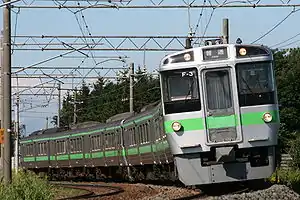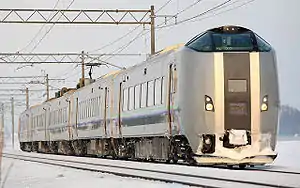721 series
The 721 series (721系) is an AC electric multiple unit (EMU) operated by Hokkaido Railway Company (JR Hokkaido) on Sapporo area suburban services in Hokkaido, Japan since 1988.[1]
| 721 series | |
|---|---|
 A pair of 721 series 3-car sets led by set F-3, August 2008 | |
| In service | 1988–Present |
| Manufacturer | Hitachi, JR Hokkaido, Kawasaki Heavy Industries, Tokyu Car |
| Constructed | 1988–2003 |
| Number built | 135 vehicles (34 sets) |
| Number in service | 135 vehicles (34 sets) |
| Formation | 3/6 cars per trainset |
| Operator(s) | JR Hokkaido |
| Depot(s) | Sapporo |
| Line(s) served | Hakodate Main Line, Chitose Line |
| Specifications | |
| Car body construction | Stainless steel |
| Car length | 21,670 mm (71 ft 1 in) (end cars) 21,300 mm (69 ft 11 in) (intermediate cars) |
| Width | 2,954 mm (9 ft 8.3 in) |
| Height | 4,090 mm (13 ft 5 in) |
| Doors | 3 per side |
| Maximum speed | 130 km/h (80 mph) |
| Traction system | Thyristor drive (1-5th batch) GTO-VVVF (6th batch onwards) |
| Electric system(s) | 20 kV AC (50 Hz) |
| Current collection method | Overhead line |
| Safety system(s) | ATS-DN |
| Multiple working | 731 series, 733 series, 735 series |
| Track gauge | 1,067 mm (3 ft 6 in) |
Design
The trains were built jointly by Hitachi, JR Hokkaido (Naebo Factory), Kawasaki Heavy Industries, and Tokyu Car (Yokohama).[2]
Fleet
As of 1 April 2012, the fleet consists of 135 vehicles, formed as 23 3-car sets and 11 6-car sets.[3]
Variants
- 721-0 series
- 721-1000 series
- 721-2000 series
- 721-3000 series
- 721-4000 series
- 721-5000 series
References
| Wikimedia Commons has media related to 721 series. |
- JR全車輌ハンドブック2009 [JR Rolling Stock Handbook 2009]. Japan: Neko Publishing. 2009. pp. 312–318. ISBN 978-4-7770-0836-0.
- Saka, Masahiro (March 2014). "JR第1世代の車両・現況と概要" [JR 1st-generation rolling stock: Current situation and overview]. Tetsudō Daiya Jōhō Magazine (in Japanese). 43 (359): 22.
- JR電車編成表 2012夏 [JR EMU Formations - Summer 2012]. Japan: JRR. May 2012. pp. 6–7. ISBN 978-4-330-28612-9.
This article is issued from Wikipedia. The text is licensed under Creative Commons - Attribution - Sharealike. Additional terms may apply for the media files.
